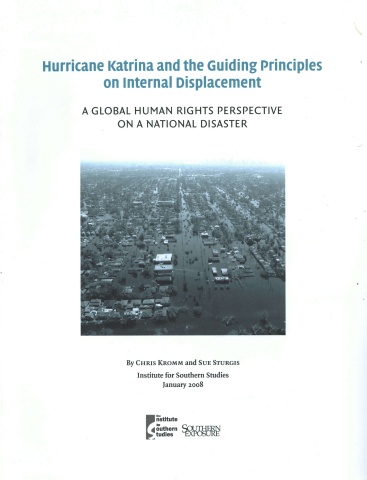Foreword

This article originally appeared in Southern Exposure Vol. 36 No. 1/2, "Hurricane Katrina and the Guiding Principles on Internal Displacement." Find more from the report here.
Hurricanes and tsunamis have displaced people from their homes throughout history. Hurricane Katrina, which struck New Orleans and the Gulf Coast in August 2005, was no exception. Hundreds of thousands of people were forced to flee their homes as the hurricane made landfall and, a few hours later, as the levees ofNew Orleans were breached. In light of heavy criticism of the U.S. government’s response to the Katrina disaster, studies have been carried out, congressional hearings have been held, and efforts have been made at all levels to examine what went wrong and to propose measures to ensure that future government responses can be more effective.
This study, published by the Institute of Southern Studies with support from the Brookings-Bern Project on Internal Displacement, focuses on the government’s response to those displaced by Hurricane Katrina through the lens of international standards, specifically the Guiding Principles on Internal Displacement.
The Brookings-Bern Project on Internal Displacement, an independent research and advocacy project, promotes a more effective national, regional and international response to address the global problem of internally displaced persons in support of the mandate of the Representative of the U.N, Secretary-General on the Human Rights of Internally Displaced Persons (IDPs). The Project has focused on developing normative standards for the protection of IDPs, beginning with the Guiding Principles on Internal Displacement in 1998 which were presented to and welcomed by the United Nations and are increasingly used by governments in developing their policies towards internally displaced persons.
Subsequent work by the Project in strengthening the normative framework for the protection of the human rights of internally displaced persons has included development of a Framework for National Responsibility, Operational Guidelines on Human Rights and Natural Disasters and A Framework for Durable Solutions for IDPs. These have been discussed and endorsed by various United Nations bodies and seek to provide further guidance to governments and humanitarian organizations seeking promote the human rights of internally displaced persons.
The Project has also carried out policy analysis and research on a number of situations of internal displacement, from Sri Lanka to Iraq. This is the first research report that the Project has supported which focuses on internal displacement in the United States. It should be noted that the Metropolitan Policy Program of the Brookings Institution has followed Katrina-related issues since the beginning and has published many reports on the impact of the disaster, particularly on the economic recovery of the region.
We are grateful to Chris Kromm and Sue Sturgis of the Institute for Southern Studies for carrying out this study, which makes a valuable contribution in analyzing the response to Katrina-induced displacement in light of accepted normative standards for internal displacement. It is also evidence that even wealthy countries need support to respond to natural disasters in a way which upholds the rights of those who are displaced.
Tags
Elizabeth Ferris
Senior Fellow and Co-Director of the Brookings-Bern Project on Internal Displacement (2008)